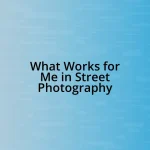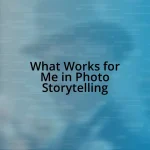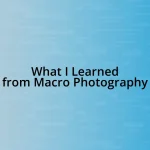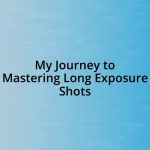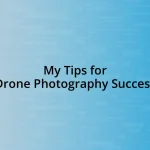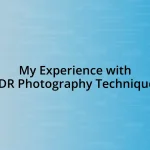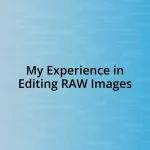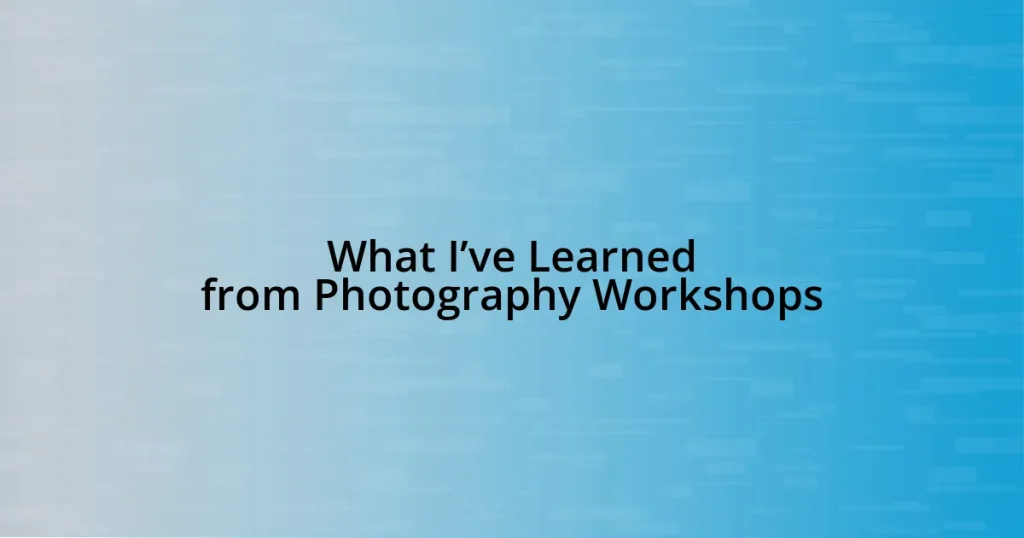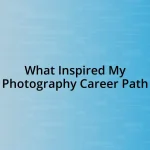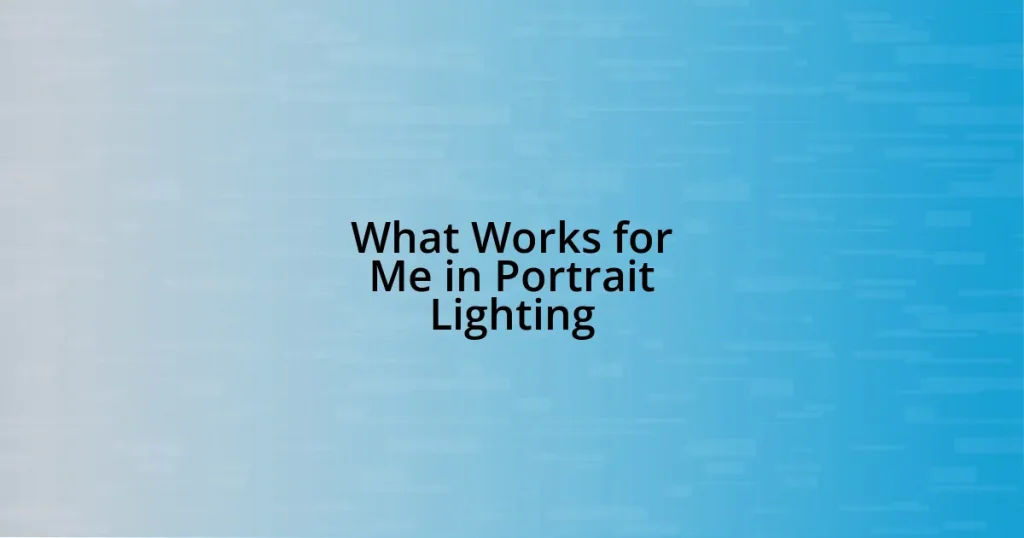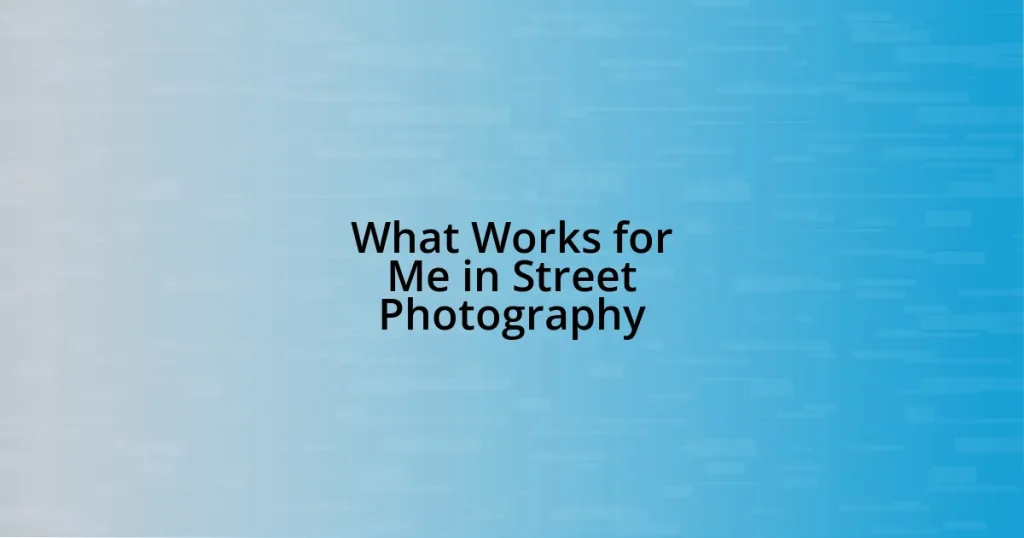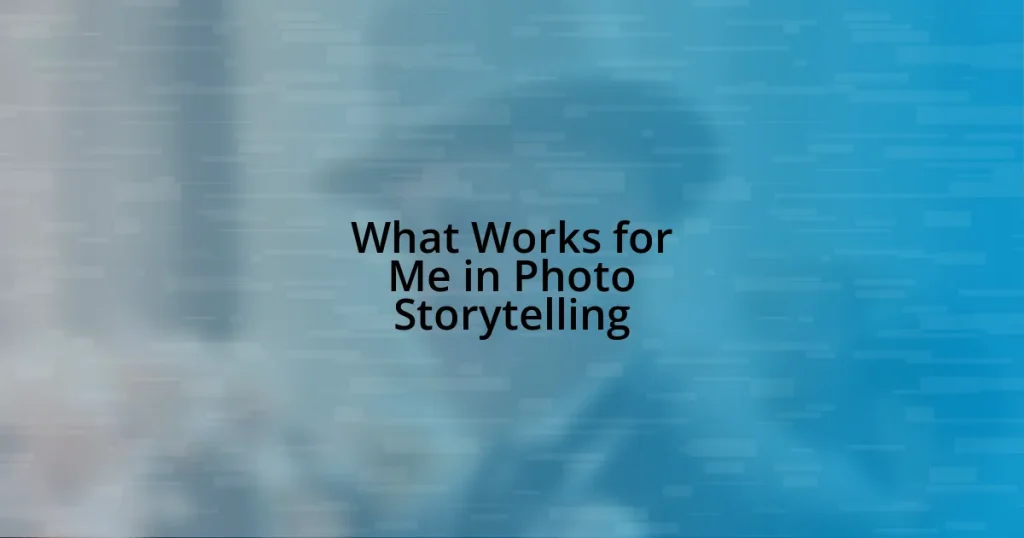Key takeaways:
- Photography workshops foster valuable connections with peers and instructors, enhancing passion and confidence.
- Choosing a workshop with a qualified instructor and appropriate focus can shape your learning experience significantly.
- Utilizing the right equipment, such as versatile cameras and quality lenses, is crucial for maximizing creative expression.
- Feedback from professionals and networking with fellow photographers can lead to personal growth and innovative ideas in your craft.
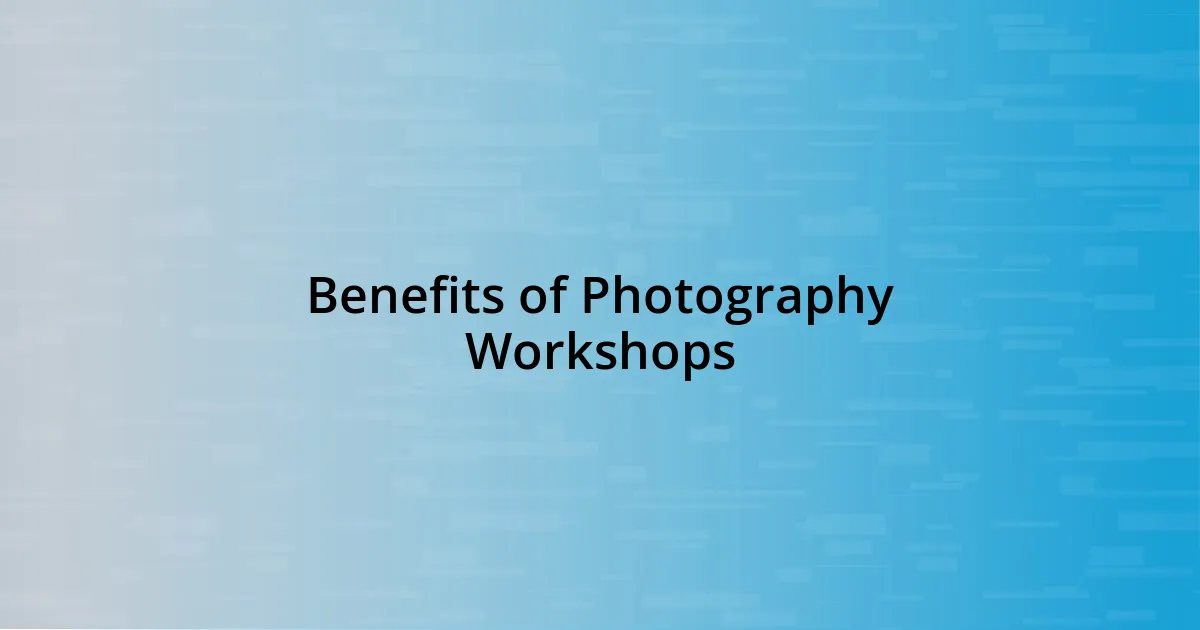
Benefits of Photography Workshops
One of the biggest benefits I’ve experienced from photography workshops is the chance to connect with fellow enthusiasts. I remember my first workshop vividly—standing there, my camera slung around my neck, feeling slightly out of my depth. Yet, sharing tips and stories with others fueled my passion and confidence in ways I hadn’t expected. Have you ever felt that electric sense of community? It’s energizing.
These workshops often provide immediate feedback from experienced instructors, which can be incredibly valuable. During one session, I captured a shot that I thought was fantastic. But, when the instructor pointed out the overexposed highlights, it opened my eyes to details I had missed. Isn’t it amazing how another set of eyes can reveal opportunities for growth that you might overlook in your own work?
Additionally, hands-on experiences in diverse environments allow us to experiment and challenge our creative boundaries. I recall a day spent shooting in a bustling market, where the colors and energy sparked countless ideas. Being in that immersive setting taught me to adapt and think on my feet. What would your photography look like if you stepped outside your comfort zone? Those moments can transform the way you see the world through your lens.
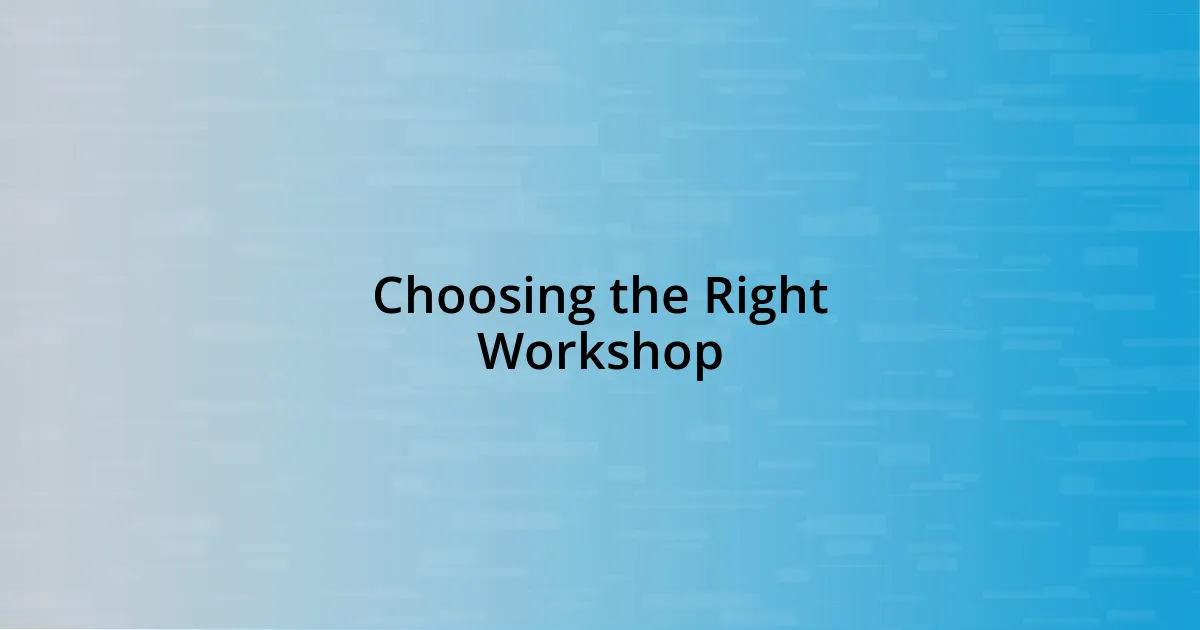
Choosing the Right Workshop
Choosing the right photography workshop can significantly impact your growth and experience. From my perspective, it’s essential to consider factors like the instructor’s expertise and the workshop’s focus. I remember attending a workshop led by an award-winning photographer specializing in wildlife, which sparked my interest in nature photography. Interacting with someone who had so much experience energized my passion further and gave me specific insights I could apply right away.
When evaluating workshops, consider these key points:
– Instructor Credentials: Research the backgrounds of potential instructors to ensure they align with your interests.
– Workshop Focus: Look for workshops that emphasize topics you’re eager to explore, whether it’s landscape, portrait, or street photography.
– Location and Environment: Choose workshops held in settings that inspire you or challenge your skills.
– Group Size: Smaller groups often allow for more personalized feedback and interaction.
– Participant Reviews: Reading testimonials can provide insight into the overall experience and quality of instruction.
Each of these points can shape the kind of experience you’ll have, ultimately determining how much you’ll learn and enjoy the process.
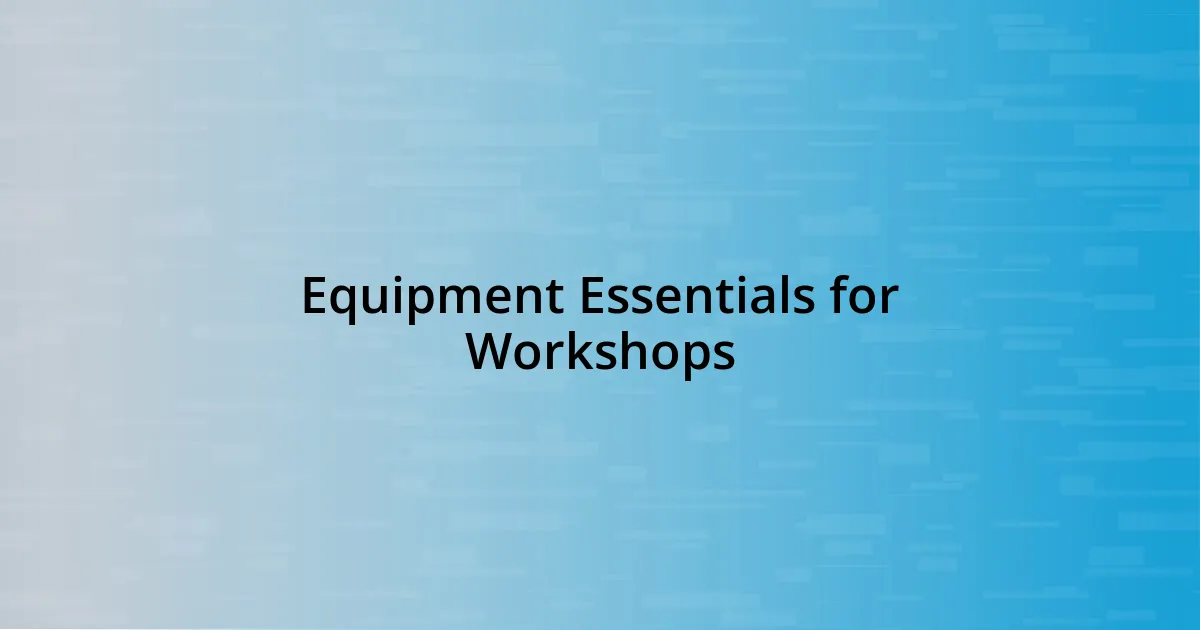
Equipment Essentials for Workshops
When it comes to attending photography workshops, having the right equipment can make a world of difference. From my experiences, I’ve noticed that a versatile camera is essential. I remember one particular workshop where many participants struggled because they brought along basic point-and-shoot models. Contrarily, those with DSLR or mirrorless cameras had the flexibility to adjust settings on the fly, capturing stunning shots. Have you considered how the gear you choose can enhance your creativity?
In addition to a good camera, investing in a quality lens is crucial. During my first workshop, I used a standard kit lens, and while it served its purpose, I felt limited. Switching to a prime lens for low-light situations later was a game changer for my nighttime shots. Selecting the right lens for the scenario can truly elevate your photography. What would your images look like with equipment tailored to your shooting style?
Finally, don’t overlook the importance of accessories. A sturdy tripod can stabilize your shots, especially in low-light conditions, and a comfortable camera bag helps you carry everything with ease. I recall feeling drained after a long day of shooting, but having a well-organized bag made it all manageable. When it comes to workshops, it’s not just about the camera itself, but how you support your creativity through thoughtful equipment choices.
| Equipment | Importance |
|---|---|
| Camera | Essential for flexibility and quality, affecting creative expression. |
| Lenses | Critical for optimizing shots in various conditions and true to your artistic intent. |
| Accessories | Support your shooting process and comfort, enhancing the overall experience. |
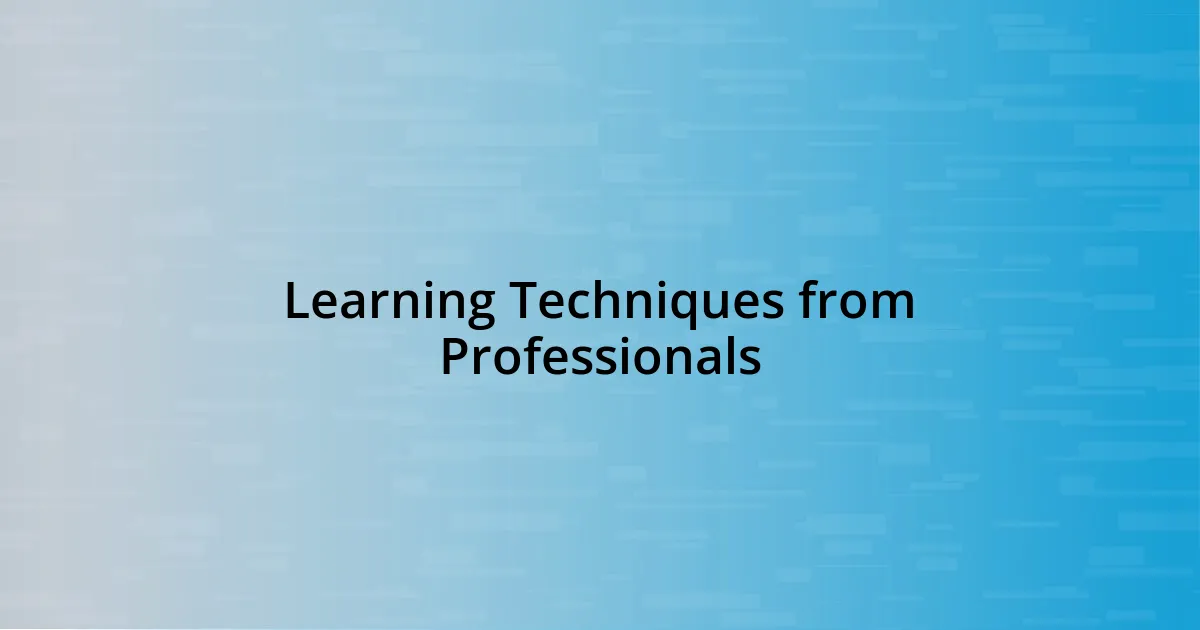
Learning Techniques from Professionals
Learning from professionals in photography workshops has been a transformative experience for me. I remember a session where a seasoned photographer demonstrated the art of composition through live examples. Watching how he expertly framed a shot made me realize the power of perspective. It was a revelation that changed how I approached each scene. Have you ever paused to really think about how the layout of a photograph can draw in the viewer?
One technique that stood out was the rule of thirds. It might seem simple, but its application can elevate a photo from ordinary to extraordinary. I practiced applying this technique extensively during one workshop and was amazed at how just shifting my focus transformed my images. Suddenly, I was more conscious of where to place my subjects and how to create balance within the frame. It’s incredible what a little guidance can do, isn’t it?
Moreover, receiving direct feedback from professionals really sharpened my skills. They provided insights on my work that I would have never considered. I remember one mentor suggesting I focus on the light in my photos—something I had overlooked in my eagerness to capture the moment. Implementing that advice made a noticeable difference in the quality of my images. This emphasizes how invaluable the experience can be; learning techniques straight from professionals might just give you that critical edge you’ve been searching for.
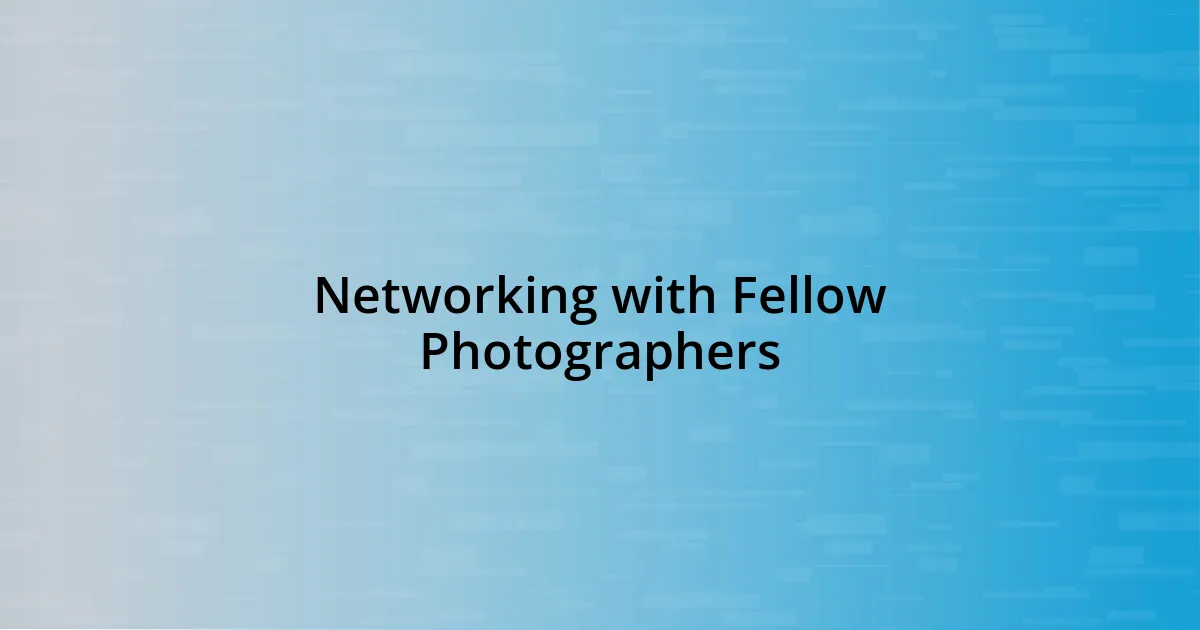
Networking with Fellow Photographers
Networking with fellow photographers during workshops has often shaped the way I approach my craft. I still recall the first workshop I attended where participants shared their personal stories and experiences over coffee breaks. Those intimate conversations not only built camaraderie but also opened doors to collaborative projects that I might have never pursued alone. Have you ever thought about how these connections can lead to unexpected opportunities?
One thing I’ve learned is that networking isn’t just about exchanging contact information; it’s about nurturing relationships. After one workshop, I found myself in a vibrant online group filled with past participants, sharing tips and resources. I was amazed at how easily we leaned on each other for feedback and encouragement. It became a supportive community that extended far beyond the workshop. How often do you seek out these connections in your creative journey?
Moreover, I genuinely believe that networking enriches our perspective on photography. During a discussion about portfolio reviews, I remember receiving constructive criticism from a participant, whose style was completely different from mine. Their fresh viewpoint inspired me to experiment outside my comfort zone. This experience reinforced the idea that collaborating with others can lead to personal growth and innovation in ways we might not anticipate. Have you ever wondered how other photographers’ insights might transform your own work?
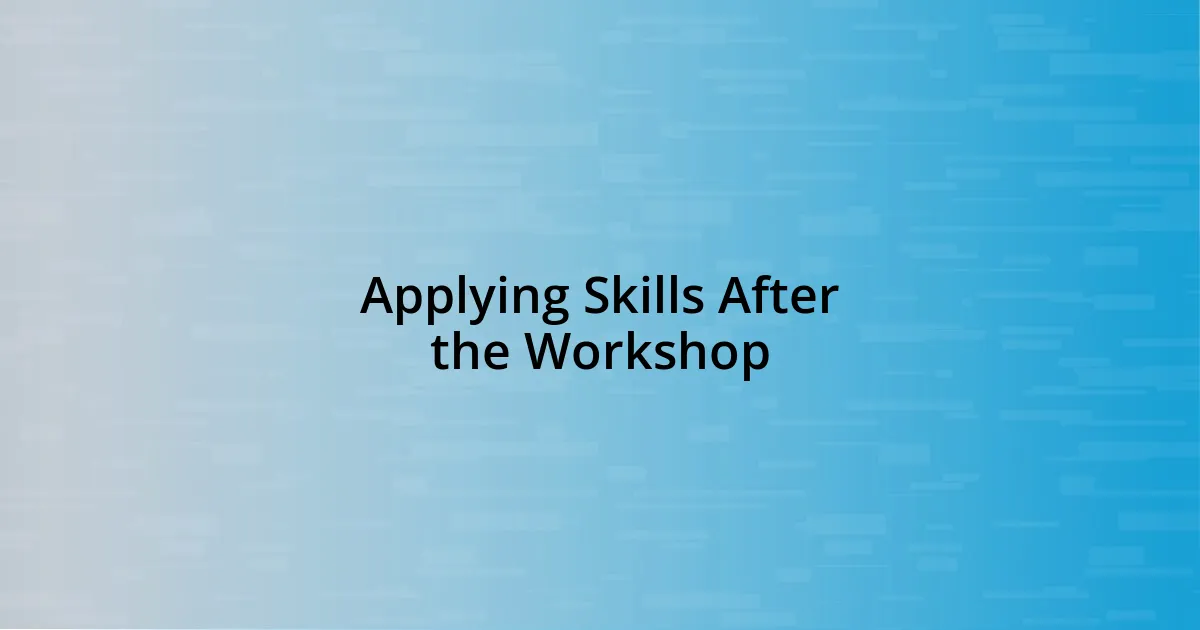
Applying Skills After the Workshop
After completing a photography workshop, I felt an exhilarating mix of excitement and uncertainty about applying what I had learned. I remember diving headfirst into a local event, applying the techniques I had mastered just days before. It was intimidating to put myself out there, but the thrill of experimenting with new compositions made it worthwhile. Have you ever felt that rush of trying to capture a fleeting moment, knowing you had fresh skills at your fingertips?
One particular moment stands out. As I framed a candid shot of a street performer, I deliberately set my focus on the rule of thirds. The difference was striking—I could feel the energy from the composition leap off the image. It made me ponder about the layers of a photograph; every decision made in the process contributed to the story. Isn’t it fascinating how a small adjustment can radically shift the narrative?
Additionally, I soon discovered that the learning didn’t stop after the workshop. I found myself frequently revisiting the feedback I received, almost like a mentor whispering in my ear as I edited my photos. It became a challenge for me to incorporate those insights into every project, especially when shooting in natural light. Have you considered how integrating mentorship feedback could refine your style in unexpected ways? The result was a significant elevation in the quality of my work, which fueled my passion even further.


